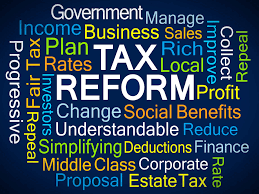
What's Happening?
Philanthropy: the Tsunami Debris of Tax Reform?
By Robert Carreau, executive director of The Schenectady Foundation

Make charitable contributions deductible. Period. Regardless of itemization.
From my perch at The Schenectady Foundation I see the broad landscape of the social sector and the impact it has on our community. We are fortunate to have in Schenectady mature, high-functioning non-profits whose leaders are passionate, knowledgeable and collaborative. We also benefit from smaller, grass-roots organizations that reach deep into the community to those who may fall through the gaps of larger programs.
I have observed the formation of innovative partnerships and programs that you don’t typically see in a community of this size. The disaster relief and recovery collaborations in 2011-12 for survivors of tropical storm Irene and in 2015 for those left homeless by the Jay Street fire; the UMatter Schenectady health initiative; Weekend Backpack Partnership, Bridges Out of Poverty, SCAP’s extensive community service navigation and the Employer Resource Network. I could go on. Community members and donors to these and many other causes should be very thankful about the state of the non-profit sector in Schenectady.
And along comes tax reform.
Like many Americans I have long wished that our federal tax system was simple, fair and balanced. That filing tax returns didn’t require as much work and expense, or create as much anxiety as I typically feel every April. And I would like it to recognize the growing spread between those with less and those with more – sensitive to the shrinking middle class and the terrible effects of generational poverty on our people, communities and nation.
But seismic changes brought on too suddenly without deep consideration of direct and indirect effects can lead to disastrous outcomes in communities like ours. The current tidal wave of tax reform could wash away with it some of the foundational elements of our highly valuable and growing philanthropic sector.
In part, buoyed by a tax code that provided incentives for charitable contributions for those who itemize their deductions, and for naming charitable beneficiaries in estate plans, our local organizations are making the best of a demanding financial environment. But the tax bill essentially eliminated these two important incentives to give for many people.
I believe that people give first and foremost out of kindness and caring for people and the world around them. They want to see lives changed and the community improved. This is now firmly imbedded in our culture. But, for many donors, the amount contributed is at least in part because there is a tax incentive – they can give more because tax laws incentivize them to. The recent tax bill significantly increased the standard deduction which will, in turn, reduce the number of households that itemize. Fewer households itemizing will likely mean a drop in donations. People will still give to charity, but analysts project a very deep reduction in the overall donations that are the life blood of non-profits.
What is the likely impact of these tax changes on charitable contributions? We hope they are minimal. But for context, about one-third of Americans currently itemize their taxes. That number could drop to as low as 5%, according to the Tax Policy Center.
Eliminating the estate tax for estates valued less than $10 million is also likely to impact the transfer of assets from estates to the charitable sector because, again, there is not financial benefit for those estates to include charitable beneficiaries. Of course, people will still leave money to charities in their wills (we all do have wills, don't we?), but perhaps not with the frequency or at the level that would leverage greater social impact.
Charitable bequests totaled $30.4 billion last year, according to GivingUSA. Changes to the estate tax could mean losing $4 billion in charitable bequests, according to the Center. For The Schenectady Foundation, which has received the vast majority of its assets through bequests made in people's wills or estate plans, tax reform has just diminished the benefit to some donors of supporting the growth and future impact of our foundation and others.
It could very well hit home. Charities that rely primarily on donations are anxiously keeping an eye on donation trends to see if there is a shift in giving. There is cause for concern should it turn out that donations drop. Tax reform abruptly hits at a time when our communities increasingly depend on philanthropy, while government sources are financially constrained in their responsibilities for the care of our citizens. The federal government is weighing significant shifts in its funding of basic services as witnessed by the precarious position of CHIP, the Children’s Health Insurance Program. Juxtapose this with the acute challenges of under-resourced communities – particularly in urban areas such as Schenectady -- and it’s not difficult to see the potential for the negative consequences should our charities lose precious financial ground.
Making charitable contributions deductible regardless of whether a taxpayer itemizes their return would be of great benefit to all taxpayers and communities. Federal tax forms could permit taxpayers taking the standard deduction to claim charitable contributions of up to a percent of adjusted net income – say 3% for starters. A family with income of $60,000 would be able to give $1,800 per year and still take the standard deduction. Contributions above that threshold could require itemization. It would provide renewed fuel for non-profits at a time when we need them more than ever.
Philanthropy is America’s beautiful baby – the envy of the rest of the world. And with good reason. Over time the growth of the charitable sector has been of great societal value -- supplementing or substituting for government activities while being highly responsive and directly accountable to donors. In our zeal to simplify the tax code, let’s not throw our baby out with the bath water.

